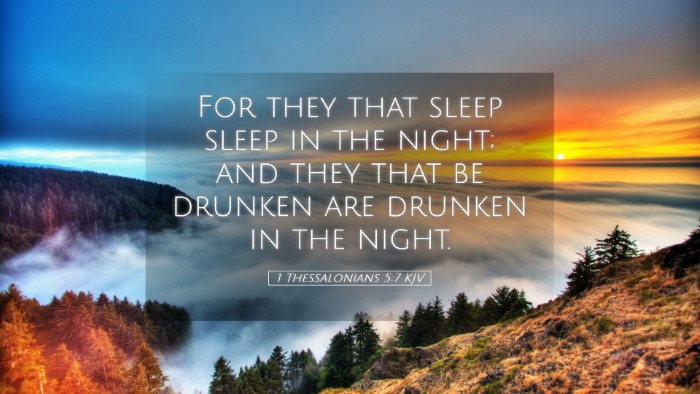Commentary on 1 Thessalonians 5:7
Verse Context: The Apostle Paul writes to the Thessalonians, addressing their spiritual concerns and providing guidance on how to live in anticipation of the Lord's return. This verse is part of a broader admonition on the nature of Christian conduct during these times.
Text of 1 Thessalonians 5:7
"For those who sleep, sleep at night, and those who get drunk, are drunk at night."
Overview of the Verse
This verse is often interpreted in light of the larger theme of vigilance and sobriety that Paul emphasizes in this chapter. Paul contrasts two ways of living: the conduct of those who are spiritually alert versus those who are spiritually asleep or intoxicated. This serves as a metaphor for moral and spiritual states.
Insights from Matthew Henry
Matthew Henry emphasizes the metaphorical language used by Paul regarding "sleep" and "drunkenness." He interprets "sleep" as a portrayal of spiritual deadness or apathy, suggesting that those who are spiritually asleep tend to live in the darkness of ignorance and sin. In contrast, to be "awake" implies being vigilant and aware of the coming day of the Lord. Henry warns that just as physical drunkenness often leads to foolish and reckless behavior, spiritual drunkenness results in a failure to recognize the urgency of living holy lives.
Insights from Albert Barnes
Albert Barnes elaborates on the concept of "sleep" as a metaphor for ignorance of spiritual realities. He notes that Paul draws a stark contrast between the behavior of believers and non-believers. Barnes highlights that people who indulge in sinful desires are often characterized by their nighttime activities, suggesting that their actions are hidden and shameful. He encourages believers to walk "as children of the day," emphasizing the necessity of being conscious of their faith and its implications in their daily lives.
Insights from Adam Clarke
Adam Clarke provides an analysis that connects the communal aspects of behavior addressed in the verse. He notes the significance of "night" in biblical literature as a symbol of moral decay and absence of wisdom. Clarke indicates that Paul uses these terms to remind the Thessalonians to be aware of their surroundings, illustrating a call to uphold moral integrity in a world that embraces sin. He suggests that to "get drunk" symbolizes a complete loss of control over oneself, warning that such a state leads inevitably to destructive consequences.
Spiritual Implications
The implications of this verse are significant for pastoral ministry and theological reflection. It serves as a clarion call for vigilance among believers. Paul invokes imagery that resonates with the audience's understanding of spiritual warfare and moral living. Pastors may find value in teaching this verse as a reminder to congregants to remain alert, not only in their moral decisions but also in their faith journeys.
Practical Applications
- Encouragement for Vigilance: This verse challenges believers to be spiritually awake and aware of their actions and their consequences.
- Contrast in Conduct: The distinction made between night and day, sleep and wakefulness, drunkenness and sobriety invites personal reflection on one's lifestyle choices.
- Call to Community Accountability: Believers are reminded to hold each other accountable in their walks of faith, promoting mutual encouragement to remain steadfast in truth.
Theological Reflections
From a theological standpoint, 1 Thessalonians 5:7 situates the believer in the dichotomy between light and darkness, as articulated throughout Scripture. The call to be sober-minded encourages a life marked by the Holy Spirit's leading, suggesting that spiritual alertness is both an individual and community-oriented process. This verse pushes theologians to reflect on the anthropology of sin and the necessity of grace in overcoming the temptations that lead to spiritual apathy.
Conclusion
In summary, 1 Thessalonians 5:7 encapsulates fundamental themes of alertness, morality, and communal responsibility in the Christian faith. The insights drawn from public domain commentaries enhance the understanding of Paul's exhortation to his audience and challenge contemporary believers to examine their spiritual state critically. As pastors, students, theologians, and scholars reflect on this verse, they are encouraged to foster a community characterized by vigilance, integral living, and a profound understanding of the hope found in Christ's return.


